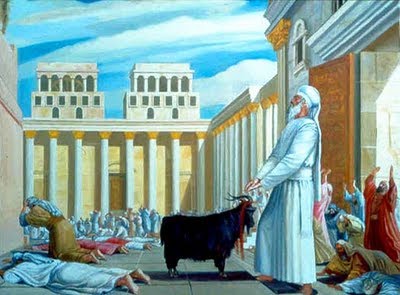Bonjour / Hello [nickname_else_first_name],
Table of contents
1) Perashat Hashavoua - Rabbi Eli Mansour
2) Halakhat Hashavoua (Halakhot related to day to day life) By Hazzan David Azerad -
-Laws pertaining to Pesah Dishes
3) Holy Jokes!
1)PERASHAT HASHAVOUA
This Week's Parasha Insight with Rabbi Eli Mansour
Parashat Vayikra- The Triple Sin of Dishonesty
Parashat Vayikra addresses the situation of somebody who falsely denied on oath owing money to another person. The Torah (5:21) gives several examples, such as a situation where a person entrusted his fellow with his object, or lent him money, and the recipient later denied receiving the object or money. Another example mentioned by the Torah is "Ashak Et Amito" – where somebody hired a person to work for him, and then denied owing him wages. If the person falsely swore that he did not owe the object or money, and then confessed his wrongdoing, he must bring a special atonement sacrifice in addition to paying what he owes as well as a fine.
The Or Ha’haim Ha’kadosh (Rav Haim Ben-Attar, 1696-1743) notes that the Torah uses three different expressions in reference to this offense. First, it says, "Nefesh Ki Teheta" – "If a soul committed a sin." Thereafter, the Torah says, "U’ma’ala Ma’al B’Hashem" – "and transgressed against G-d." Finally, the Torah describes "Ve’kihesh Ba’amito" – that the person "denies his fellow."
The Or Ha’haim explains that these three phrases refer to the three different aspects of this sin, falsely denying a debt that one owes to his fellow.
Firstly, and most obviously, "Ki Teheta" – such a person commits the sin of theft, keeping for himself that which belongs to his fellow. Such conduct constitutes theft, plain and simple, no different from forcibly seizing someone else’s possession.
Secondly, "U’ma’ala Ma’al B’Hashem" – this denial amounts to a direct offense against G-d Himself. If a person rightfully owns something, then we must believe that G-d, in His impeccable justness, determined that this person should own that money or that piece of property. If a person keeps for himself that which belongs to his fellow, then he in essence casts aspersions on G-d’s justice, challenging G-d’s decision to give the object or money in question to the other individual. The Or Ha’haim suggests that the Torah uses a double expression – "U’ma’ala Ma’al" – to allude to the two injustices that the liar is attributing to G-d: he challenges G-d’s decision that his fellow should have this property, and he also challenges G-d’s decision that he himself should not have it. This challenge against G-d’s justice is the second aspect of this offense.
Finally, the Torah speaks of this person as "Kihesh Ba’amito" – literally, "denying his fellow." He does not just deny owing his fellow the object or money that he owes; he denies his fellow’s uprightness. He essentially accuses the rightful owner of what he himself is guilty of – dishonesty, charging that he is trying to steal by falsely claiming that he is owed money or an object. The person thus not only casts aspersions on G-d – he casts aspersions on his fellow, turning him into the criminal.
Seeking to profit through dishonesty is thus a triple crime – theft, a challenge against G-d’s justice, and falsely accusing one’s fellow of wrongdoing. Each one in its own right suffices for us to avoid such misconduct; the combination of all three makes dishonesty especially egregious, and requires us to exercise extreme care to conduct all our financial affairs with strict honesty.
2) HALAKHAT HASHAVOUA
Halachot this week are selected and Translated by Hazzan David Azerad
Pesach Laws according to the rulings of Rabbi Obadiah Yosef ZT”L
How do we kosherize glassware for Passover?
According to the Sephardim glassware do not need any kosherizing, and it is permissible to use them on Passover, provided that they are washed and dried well.
Ashkenazim are stricter with glassware that has been used with hot items, and may not use it on Passover. However, Duralex and Pyrex glass vessels, which are used for cooking over the actual fire, Ashkenazim can use them by doing Hagala (pouring hot boiling water) three times and use them on Passover.
How do you kosherize pottery and porcelain for Passover?
Pottery – cannot be kosherized, because the Torah testified that they do not emit. Therefore,one should make sure that there is no noticeable leaven in them, and place them in a designated area, and may not use them on Passover.
Porcelain dishes – can not be kosherized as well, they have the same status as pottery.
Bevirkat Shabbat Shalom Umevorach
David Azerad
3) HOLY JoKeS!!
Selection of funny snippets, loosely related to this weeks parashah or current events, to brighten your day
Why did the cow refuse to be slaughtered?
BECAUSE IT’S A PAIN IN THE NECK!
What do kabbalas dam and baseball have in common?
THEY BOTH HAVE A PITCHER AND A CATCHER!
What do you call a korban on an airplane?
A SACRIFICE FLY!
Did you hear about the baseball player that got into a car accident?
IT WAS A HIT AND RUN!









